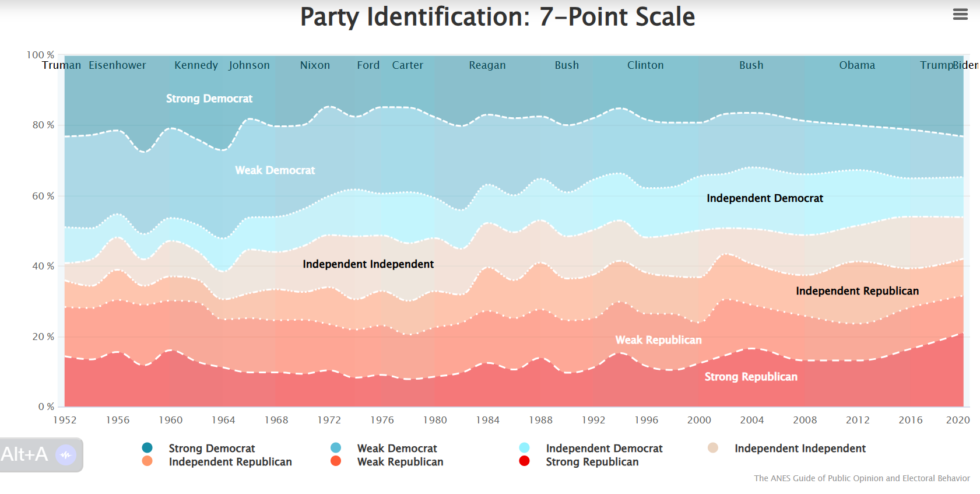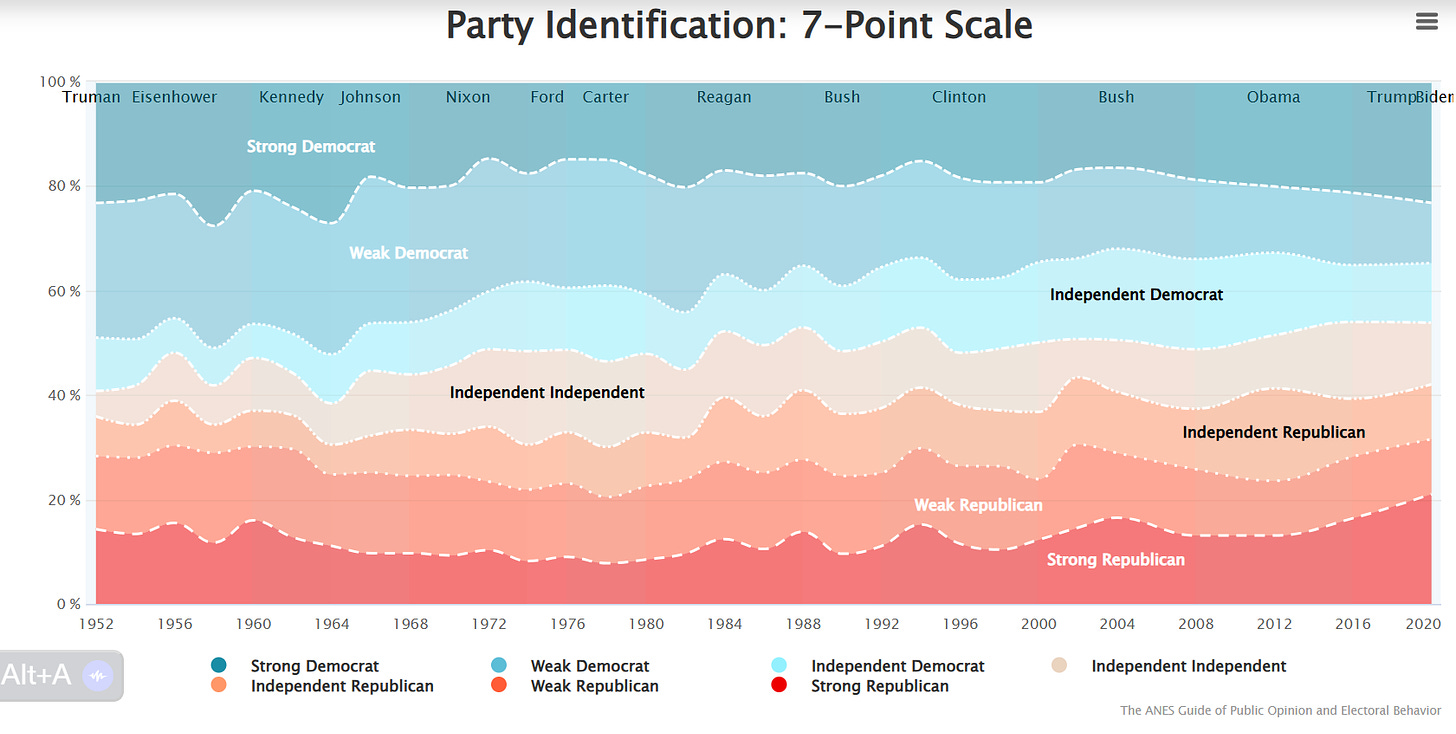
A subplot emerging from last week’s primary may be voters caring less about where a candidate stands on Trump, and more on how well they understand what’s happening at home.
The idea that American voters are locked in an ever-spiraling cycle of extremism that is responsible for our currently “polarized” society is an easy way to talk about our current political situation. But is it accurate?
In 1994, New Gingrich “nationalized” congressional elections by convincing voters that what happens in Washington has as great an impact on you locally as do your local elections. Consequently, he was able to convince many that the way to improve things locally is to ensure that the national, state, and local candidates are rowing in the same direction.
In the years since, we’ve increasingly felt the impact of nationalized issues on local elections.
In the wake of Tuesday’s election, however, there may be signs that this nationalization is beginning to fray.
Local party leaders are seeing voters who are balancing national, single-issue concerns like abortion and public education on one hand, with increasing frustration about the workings — or perceived failures — of local governments on the other hand. And their perceptions of both appear to be affecting the way they approach elections.
More Discussions, Please
Standing outside a hot dog food truck on Tuesday night before Derrick Anderson made his acceptance speech, Scott Vezina was celebrating what proved to be a very successful day at the polls for the Fredericksburg Republican Committee.
“We had 40 more people sign-up for the Republican Committee,” Vezina said.
In Democratically controlled Fredericksburg, 40 people signing up for the Republican Committee isn’t going to flip the local electoral math anytime soon. But it does raise some interesting questions. Is this a reflection of Trump’s gaining ground with Black voters? Or is something else fueling the movement?
Vezina, who is chairperson of the Committee, doesn’t think it’s necessarily what’s happening nationally.
“In Fredericksburg, there are certainly some Republicans who are very pro-Trump, and they’re very loyal to him,” he said. “But the majority of people I talk to say I’m Republican and will vote that way, but what I care about is what’s happening locally.”
To Vezina, it’s an indication that people are “beginning to think more independently.”
In particular, he is hearing increasing frustration with what some in the city see as a lack of transparency.
Vezina points to an episode in January when Council was hearing from citizens during public comment period about proposed zoning changes that would affect density and the height of new construction. While citizens were talking, several text messages were exchanged among council members that appeared dismissive of select speakers.
“That text message was a really big issue for a lot of people,” Vezina said. “There were Dems, Republicans, Libertarians at that meeting saying we have a big problem here. It wasn’t [that] people are against more housing, but you’re ramming something through and we want to talk about it.”
The recent controversy over the Mary’s Landing site is another example.
To a portion of the city, such actions lend an air that City Council is going to act as it pleases, without hearing from constituents.
In a discussion with the Advance this past April, Council Member Jason Graham, whose texts were at the center of the January controversy, has a different perspective on what’s happening.
Asked about concerns that more housing options will change the character of the city, Graham replied:
“As a city, you’re either growing or dying. Stasis isn’t possible. … The changes we are proposing will allow certain things to occur, but it won’t happen all at once. Rather, these changes are incremental steps toward trying to ensure that we’re not pricing everyone out of the city.”
For some voters, however, the issue isn’t over who’s right and who’s wrong on policy, but whether or not their views and perspectives are being heard and thoughtfully weighed.
Managing Expectations
Jeff Kent is the relatively newly minted chairperson of the Spotsylvania Democratic Committee, and he agrees that frustration with local government is having a role in the way people vote this year. For him, however, it goes beyond transparency.
“Is it a lack of transparency,” he asks the Advance, “or is there … a higher expectation that [a voter] should be able to know anything in government at any time?”
By any measure, citizens today have more and easier access to government information than they’ve arguably ever had. This acceleration in information, ironically, may be driving more suspicion of what government is up to.
Kent points to the current debate in Spotsylvania, for example, over the firing of Mark Taylor as the superintendent of the school division.
“People are demanding to know why Mark Taylor was dismissed because they feel they have a right to know,” he told the Advance, but they don’t. Taylor’s firing is an “HR situation” and that information is protected under law.
Voters, Kent says, feel more emboldened to say that if a politician won’t give them what they want, they’ll “jump.”
What’s lost, he continues, is an understanding that politicians and government employees are not just serving one constituency, but all of them, and “we have to make compromises.”
From Political Identity to Service
The frustrations that voters are wrestling with in Fredericksburg and Spotsylvania point to rough waters ahead for the two candidates contending for Spanberger’s seat.
Namely, how do Derrick Anderson and Eugene Vindman craft messages that can both unite the voters of the 7th District behind them, while still respecting the seriousness of the local problems that they’re facing?
It’s an old problem in politics — the General Election is an entirely different race from the primaries, and requires retooling messages to appeal to a broader base.
But if voters are going to be casting their ballots at least in part based on their feelings about their local governments, then both Anderson and Vindman face a challenging path ahead, indeed.
A nationalized message runs the risk of sounding dispassionate and disconnected — whether it’s Anderson or Vindman delivering it. Too local a message, and candidates unnecessarily alienate voters on the margins.
Perhaps these troubled waters are pointing to a better way forward.
By some accounts, Americans’ desire to define themselves by party identity has grown sharply over the past 20 years, roughly corresponding to the nationalization of political races. But looked at more broadly, the percentages of people who align themselves to parties has not changed all that much over the past 70 years.
The American National Election Studies (ANES) project out of the University of Michigan has since 1952 been measuring people by “party identification” to assess how strong voters tie themselves to a political party.
It does this by surveying voters and placing them on a 7-point scale: Strong Democrat, Weak Democrat, Independent Democrat, Independent Independent, Independent Republican, Weak Republican, and Strong Republican.

What is so striking about this charting is how consistently since 1952 Americans have been distributed across these categories.
It is true that people identifying as Strong Democrat and Strong Republican have grown since 2012, In 2020, Strong Democrats were 23.3% of people surveyed, the highest number recorded since 1964, and Strong Republicans were 21%, the highest number ever for that cohort, while those voters categorized as Weak Democrats and Weak Republicans has narrowed.
This consistency in political affiliation should be a reminder that appealing to single-issue items and demanding voters fall in line behind one political worldview or another is destined to be unsuccessful.
Looking to two of the most-successful congressional politicians in the 540 over the past several years — Spanberger, Bobby Orrock — it’s easy to see a unifying thread in their approaches, despite the chasm that exists in their political orientations.
Constituent services.
Congressional leaders who recognize the importance of local elections, and don’t lose sight of this during their tenure on Capitol Hill, tend to do better than those who throw themselves into the national debate.
To this point, neither Anderson nor Vindman has clearly defined how they view constituent services and how they would serve the citizens of the 7th.
If local party leaders are right, however, and voters are turning their attention from the national story to the local realities they face, the key to victory in November may well fall to the candidate who can convince voters he’s there to serve them first.
Follow us on Facebook | Instagram | Youtube

Local Obituaries
To view local obituaries or to send a note to family and loved ones, please visit our website at the link that follows.

Support Award-winning, Locally Focused Journalism

The FXBG Advance cuts through the talking points to deliver both incisive and informative news about the issues, people, and organizations that daily affect your life. And we do it in a multi-partisan format that has no equal in this region. Over the past month, our reporting was:
$8 a month supports great journalism
- First to report on a Spotsylvania School teacher arrested for bringing drugs onto campus.
- First to report on new facility fees leveled by MWHC on patient bills.
- First to detail controversial traffic numbers submitted by Stafford staff on the Buc-ee’s project
- Provided extensive coverage of the cellphone bans that are sweeping local school districts.
- And so much more, like Clay Jones, Drew Gallagher, Hank Silverberg, and more.
For just $8 a month, you can help support top-flight journalism that puts people over policies.
Your contributions 100% support our journalists.
Help us as we continue to grow!





